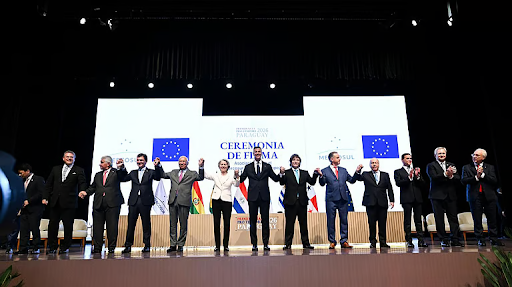



.png)
.png)
Copyright infringement not intended
Picture Courtesy: https://www.globalsecurity.org/military/world/int/csto.htm
Context: Armenia freezes participation in the Collective Security Treaty Organisation (CSTO)
Details
Reason
Background
_1.png)
About Collective Security Treaty Organization (CSTO)
|
Aspects |
Description |
|
Founding Members |
Armenia, Russia, Kazakhstan, Kyrgyzstan, Tajikistan, Uzbekistan |
|
Year Founded |
1992 (Treaty signed), 2002 (Organization formally established) |
|
Current Members |
Armenia, Belarus, Kazakhstan, Kyrgyzstan, Russia, Tajikistan |
|
Headquarters |
Moscow, Russia |
|
Main Goals |
Strengthening peace, regional security, and stability: The CSTO aims to create an environment conducive to economic development and prosperity in the region. Protecting the independence, territorial integrity, and sovereignty of member states: This includes collective defence against external aggression and assistance in countering internal threats like terrorism and organized crime. Promoting collective response to external threats: The CSTO members consider an attack on one member state an attack on all, requiring a joint response. |
|
Key Features |
Intergovernmental military alliance: The CSTO is not a supranational organization, and member states retain their independence. Joint military exercises and peacekeeping deployments: The CSTO conducts regular military exercises to improve interoperability between member state forces and has deployed peacekeeping missions to Tajikistan and Kyrgyzstan. Collective defence principle (attack on one is considered an attack on all): This principle is enshrined in the CSTO treaty and forms the cornerstone of the organization's military cooperation. Cooperation in security matters, including intelligence sharing and border security: Member states share intelligence and coordinate border security efforts to prevent and combat transnational threats. |
|
Peacekeeping Operations |
Tajikistan: The CSTO peacekeeping mission in Tajikistan (CSTO Peacekeeping Force in Tajikistan) was established in 2001 to help stabilize the country after a civil war. The mission currently consists of approximately 1,700 troops from member states. Kyrgyzstan: The CSTO deployed a peacekeeping force to Kyrgyzstan in 2010 following violent unrest in the country. The mission was short-lived and was withdrawn after a few months. UN Mandate: The CSTO can also deploy peacekeeping missions under the mandate of the United Nations Security Council. However, this has not occurred yet. |
|
Challenges and Criticisms |
Limited effectiveness in real-world conflicts: Some argue that the CSTO has not been effective in addressing major regional security challenges, such as the ongoing conflict between Armenia and Azerbaijan. Accusations of being a tool for Russian influence: Critics view the CSTO as a means for Russia to maintain its dominance in the region and limit the foreign policy autonomy of other member states. Internal divisions and differing interests: Member states may have differing national interests and priorities, which can create challenges for coordinated action within the organization. |
|
PRACTICE QUESTION Q. Which of the following countries is NOT a current member of the Collective Security Treaty Organization (CSTO)? A) Tajikistan B) Belarus C) Kazakhstan D) Uzbekistan Answer: D Explanation: While Uzbekistan was a founding member of the CSTO, it left the organization in 2012. |



© 2026 iasgyan. All right reserved